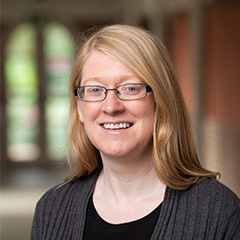
What’s new in the Microbiome?
Counting down to 'Microbiome Interactions in Health and Disease 2022'
In late October the Wellcome Connecting Science (WCS) ‘Microbiome Interactions in Health and Disease’ meeting returns to the Hinxton Hall Conference Centre, on the Wellcome Genome Campus – this time in hybrid format. This long-running series of microbiome conferences – started in 2012 – explores how the networks formed by our microbiome (i.e. the bugs that live on our skin, and in our mouth, gut, lungs etc) communicate with the host and examines the factors that influence these interactions. The meeting has always encouraged discussion on advances that have been enabled by large-scale approaches and emerging technologies.

Ahead of October’s meeting, Dr Treasa Creavin, caught up with Professor Lindsay Hall (LH) and Dr Alan Walker (AW), two members of the programme committee, for their take on where we are with microbiome research and what we can look forward to at this year’s conference.
What are the challenges in the microbiome field?

LH: Moving beyond causation to understanding the mechanism(s) is key, although it’s challenging because of the need for robust models and integration of multi-omic datasets. Another challenge is open data and access to strains – even though large studies are published, the data are not always open, and/or in a readily accessible format for other researchers. There are often issues with incomplete metadata that makes (re)analysis problematic. We need more strains to be deposited in culture collections so other researchers can gain access to them for their own experimental systems.

AW: One of the main challenges we face in microbiome research is that the recent, very exciting, increase in research activity has unfortunately also brought with it some unjustified hype. There is now a lot of misinformation currently available in the press, and on the internet. It is therefore important that we tackle issues of poor reproducibility in the field, and do more mechanistic rather than correlative research, to ensure the general public receive more robust advice.
What are the opportunities in the microbiome field?
LH: There are opportunities to explore the ecosystem as a whole – we need to look beyond the bacteria, to all other microbes present in and on the host. This is also crucial for the next stage of translational projects, where some of the key strains and ‘cocktails’ are being tested in the farm or clinic. Understanding the ecosystem dynamics and impact on the host immune system, by identifying the mechanisms at play in these ecosystems, will be crucial if the use of these cocktails of microbes in animal and human health is to be successful.
AW: Although we are now very good at cataloguing the many microbes that make up our microbiome, we actually know very little about most species, and how they might impact on our health. There is so much to be learned from mechanistic studies, and with so many poorly characterised microbes, there are infinite possibilities for new research.
Can you tell us about a favourite moment from a previous microbiome conference?
LH: I remember really enjoying the networking during the posters and over drinks at the last meeting I presented at before the pandemic. It was great to be in the same room for all the talks, enabling everyone to really get a complete oversight of exciting developments in the microbiome field. I joined the committee in 2020, and the meeting was online for the past 2 years due to the pandemic – that was also very successful.
AW: Well my most cited publication actually stems directly from a previous Wellcome Connecting Science microbiome conference! At the end of one day, Susannah Salter, Mike Cox, Nick Loman and I were chatting over a few beers in the Hinxton Hall bar about contamination issues we had all spotted in microbiome datasets. Inspired by the chat, we designed the experiments that would eventually form the basis for our own paper, at a table by the bar. So I have this series of microbiome conferences, and a few beers, to thank for my first ever senior author paper!
What is exciting about the 2022 conference?
LH: I am so excited for the meeting to be back in-person – I cannot wait for that buzz that comes with chatting to people about their science. I am also delighted this is hybrid, so really opening up the options for those who may not be able to attend for different reasons – making it flexible and inclusive.
AW: I am looking forward to hearing some great talks in-person, and we have some really fantastic speakers lined up this year, as is usual for this conference series. I am also really delighted that the hybrid format will allow those who are unable to join us in-person to enjoy and learn from the content too.
What is your advice to junior researchers working in the microbiome field?
LH: The microbiome field is so interdisciplinary that you can work on different topics, and apply your knowledge and skills in lots of different ways. So do not be afraid to apply for jobs that are not in your exact area. There are always new technologies coming out and new tools for analysis, and given the huge potential for translation, there is a real opportunity to see your work positively impact animal and human health. Communication is also key – to bring the world of microbiome to life for the wider public. Be open to thinking about jobs that are not necessarily in academia, as these are also super exciting opportunities.
AW: It’s important to make the most of opportunities that arise, as luck can play such an important role in a successful research career. Take the opportunities that come your way – especially when you are at a conference – ask that question, talk to the speakers and make the most of your chance to connect with others in your field. More generally, try to work with people you find interesting, inspiring and get along well with. Life is more fun if you work with good people!
The 2022 meeting will focus on a variety of exciting topics, including:
- Microbiome and cancer
- Respiratory health, microbiome and the age of Covid
- Nutrition, metabolism and the microbiome
- Methodological and modelling innovations
- Beyond bacteria
- Exploring the microbiome – lessons from the animal kingdom
The programme will also include short oral presentations selected from abstracts, lightning talks, posters, discussion sessions and networking opportunities for what promises to be a highly interactive conference.
Abstracts are due by 6 September | Registration for attending in-person closes on 27 September and virtually closes on 17 October.
